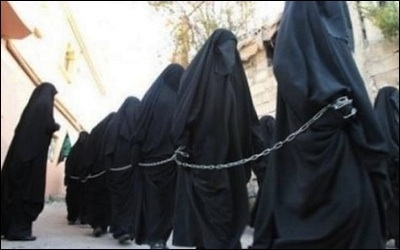Sex Slavery and the Islamic State
Mark Durie
On Line Opinion
July 3, 2015
http://www.meforum.org/5361/islamic-state-sex-slavery
Jamie Walker, Middle East correspondent for The Australian, asked two critical questions in a recent article that discussed the involvement of two Australian citizens, Mohamed Elomar and Khaled Sharrouf, in Islamic State sex slavery. In 2014 Elomar purchased sex slaves, of whom four, all Yazidis, later escaped to a refugee camp, where the ABC caught up with them and interviewed them. Elomar had also boasted on Twitter that he had “1 of 7 Yehzidi slave girls for sale” at $2500 each.
Walker’s questions were “why this debased appeal seems to be gaining traction with Islamic State’s target audience, which increasingly includes women, and why it’s not challenged more stridently in the public arena.”
The Islamic State has given its own answer to the first question. In the fourth edition of its magazine Dabiq, it aggressively promoted sex slavery as an Islamic practice, arguing that the practice conforms to the teaching and example of Muhammad and his companions.
Many Muslim scholars have upheld the practice of enslaving captives of war. |
Does this argument have any wider appeal than among Islamic State recruits?
The reality is that many Muslim scholars have upheld the practice of enslaving captives of war. For example Islamic revivalist Abul A’la Maududi wrote in his influential and widely disseminated tract Human Rights in Islam that for Muslims to enslave their captives was “a more humane and proper way of disposing of them” than Western approaches. Enslavement by Muslims, he argued, is preferable to the provisions of the Geneva Convention because of the value of this policy for fuelling the growth of Islam:
The result of this humane policy was that most of the men who were captured on foreign battlefields and brought to the Muslim countries as slaves embraced Islam and their descendants produced great scholars, imams, jurists, commentators, statesmen and generals of the army.
Islamic revivalist movements that look forward to the restoration of an Islamic Caliphate have repeatedly endorsed the practice of slavery in the name of their religious convictions. For example the (now banned) Muhajiroun movement in the UK announced in an article, “How does Islam Classify Lands?” that once a true Islamic State is established, no-one living in other nations (which it calls Dar al Harb, ‘house of war’) will have a right to their life or their wealth:
[H]ence a Muslim in such circumstances can then go into Dar Al Harb and take the wealth from the people unless there is a treaty with that state. If there is no treaty individual Muslims can even go to Dar Al Harb and take women to keep as slaves.
It is a problem that the Qur’an itself endorses having sex with captive women (Sura 4:24). According to a secure tradition (hadith) attributed to one of Muhammad’s companions, Abu Sa’id al-Khudri, this verse of the Qur’an was revealed to Muhammad at a time when Muslims had been ‘refraining’ from having sex with their married female captives. Verse 4:24 relieved them of this restraint by giving them permission to have sex with captive women, even if the women were already married.
Abd-al-Hamid Siddiqui, a Fellow of the Islamic Research Academy of Karachi and the translator into English of the Sahih Muslim, commented on this tradition, saying:
When women are taken captive their previous marriages are automatically annulled. It should, however, be remembered that sexual intercourse with these women is lawful with certain conditions.
There have been many cases reported across the centuries of Islamic armies using captive women for sex slavery, but is this any different from all wars? It is different in one important respect — that the mainstream of Islamic jurisprudence has justified and supported this practice on the basis of Islam’s canonical sources, including Muhammad’s own example and teaching. Islamic sex slavery is religiously sanctioned ‘guilt-free sex’.
Islamic sex slavery is religiously sanctioned ‘guilt-free sex’. |
This religious teaching is impacting our world today because the global Islamic community has been deeply affected by a grassroots religious revival, which seeks to purify Islam and restore it to its foundational principles, which include rules for war and the treatment of captives.
This leads us to Walker’s second question: why is the Islamic State’s ‘debased appeal’ not ‘challenged more stridently in the public arena’?
An obstacle that stands in the way of such a challenge is that it would require a sober evaluation of the Islamic character of sex slavery. However, even suggesting a link between Islam and ‘terrorism’ has become taboo to those who are afraid of being judged intolerant. Not only do some impose this taboo upon themselves, but they are quick to stigmatise those who do not partner with them in this ill-considered ‘tolerance’.
It is not a sign of tolerance when free people deliberately silence themselves about the ideological drivers of sex trafficking. |
The taboo attached to making any link between Islamic State atrocities and the religion of Islam was apparent in comments by Greg Bearup on his interview with South Australian politician Cory Bernardi. During the course of the interview Senator Bernardi linked the Islamic State with Muhammad’s example, to which the interviewer wrote “Kaboom!”, and called the comment a ‘hand grenade’, ‘inflammatory’ and ‘divisive’.
While it is a hopeful sign that some Muslims, such as Anooshe Mushtaq, have been willing to explore the Islamic character of the Islamic State, non-Muslim opinion-makers should show more backbone by engaging with the issue at hand.
It is not a sign of tolerance when free people deliberately silence themselves about the ideological drivers of sex trafficking. The same can also be said of acts of terrorism, such as the world has witnessed over the past week in France, Tunisia and Kuwait.
Until societies are able and willing to have a frank and free discussion of the ideological drivers which motivate acts of terror and abuse, they should not expect to be able to develop effective strategies to contain or wind back such atrocities.
A state of denial is a state of defeat.
Mark Durie is the pastor of an Anglican church, a Shillman-Ginsburg Fellow at the Middle East Forum, and Founder of the Institute for Spiritual Awareness.





















